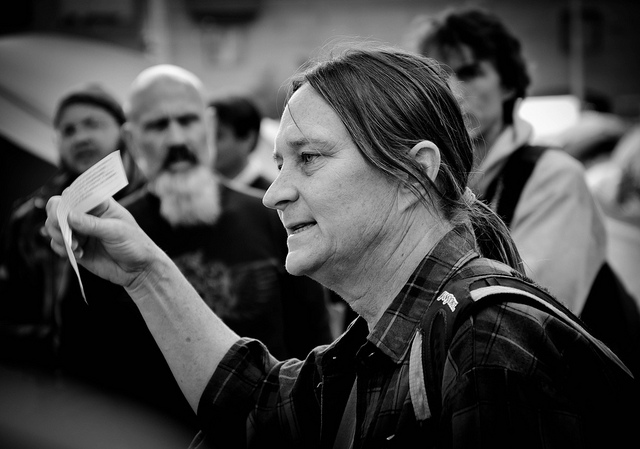In the digital era, political activism can be individual as well as collective
The internet has changed society in numerous different ways, and with it has influenced the nature of political activism. Rebecca Rumbul argues that this can entail a shift from collective action along traditional participatory lines, to individual action, with web users able to act alone on the issues that interest and motivate them.

Credit: Michele Ursino, CC BY ND 2.0
Ponder briefly on the term ‘civic participation’ and it is likely that images of community activity, such as helping out local elderly people, leading youth groups, caring for allotments, holding street parties or taking part in town hall meetings spring to mind. Activity that is primarily collective and ‘real world’ within a locale. Civic participation in the digital age, however, is a more fluid concept. Much formal contact between citizen and government is now done in an individual and faceless manner.
Online digital tools have proliferated with the aim of empowering citizens to have their say on the civic and political issues that matter to them, and to hold institutions and decision-makers to account. These range from simple petition sites such as38 Degrees, to sites such as Digital Democracy enabling individuals to try to get closer to their MP’s. The difference with many such digital ‘civic tech’ tools, is that participation more often occurs on an individual basis. Even in instances where signing a petition to support a larger campaign could be considered a collective activity, often individuals have no further contact with the community, online or otherwise, beyond the click of a mouse.
Much has been made of the arms-length, light touch engagement of so-called ‘clicktivism’ as less meaningful in its impact, and less generous in its level of participation. Individual civic action is regarded often as driven by private interest and therefore of little value to the wider public. Its label as somewhat ‘parochial’ within some of the academic literature suggests a tendency to view individual digital action as less meaningful than something collective that is conducted offline.
Recent research conducted by the University of Manchester and mySociety focused on finding a link between online individual civic action and offline community participation. This research found that a link can indeed be established. But in an increasingly digital and individually customisable world, is it right to concentrate our focus towards offline community activities? Can we really assume that individual civic participation without an offline, collective element is less meaningful or impactful?
There is no denying that a volume or quantity of interested citizens acting as a group can make a huge difference in achieving change in civic life, but the impact of individual digital civic participation can manifest in a number of ways beneficial to society as a whole. Use of civic tech by individuals to raise important civic concerns has the potential to increase the personal efficacy of citizens at an individual level. mySociety is now at the beginning of a two year research project looking into the impact of civic tech around the world, specifically, whether it truly enables citizens to exert power over institutions not in a collective sense, but in in a functional and highly individual sense.
If civic tech enables individuals to interact with institutions and decision-makers directly regarding their civic issues, and have those issues addressed, can this not make a (sometimes significant) contribution to the greater good? Open source software for local issue reporting such asFixMyStreet is in operation in many countries, and enables citizens to quickly report problems with their local environment. Use of this mechanism has a clear benefit for the reporting individual, but the report and subsequent fix of a pothole, streetlight, or the clearing of dog fouling, surely benefits the majority of individuals using the same local area. The responsiveness of the authority in fixing the issue can also inform the citizen’s choice in future electoral decision-making.
Viewed from a different perspective, the cumulative effect of entirely individual actions carried out using civic tech can improve or significantly alter behaviour of institutions and decision-makers. An example of this can be taken from TheyWorkForYou.com, which displays the votes and speaking instances of individual MPs. When it came to the attention of some MPs that citizens were monitoring how often they spoke in the chamber, as reported by The Times in 2006, several MPs increased the number of times they spoke. In most cases however, they did not speak of anything of substance, and this therefore skewed the totals for individual MPs and compromised the integrity of the information being provided to citizens.
TheyWorkForYou.com has now overcome this issue, however this case provides a clear example of the power of civic tech, used in an individual manner, in having an impact upon the behaviour of decision-makers. Using a different example, ‘Right to Information’ civic tech portals (or Freedom of Information as we know it here in the UK) are in operation in over 20 countries around the world facilitating citizen requests to publicly held documentation. Individual interest in acquiring information, and its subsequent public display through civic tech websites, has the cumulative effect of increasing the overall amount of information on public bodies available to citizens.
The point here is that individuals use various civic tech tools for very different and often highly individualistic purposes, however the cumulative or wider effect of individual actions can create a significant (if sometimes unexpected) impact. Civic participation can no longer be viewed through the lens of focused collective action, and there is much to learn in understanding the most effective and impactful individual use of civic tech in digitalising and broadening democratic engagement.
—
Note: this post represents the views of the author, and not those of Democratic Audit UK or the LSE. Please read our comments policy before posting.
—
 Rebecca Rumbul is Head of Research at mySociety. She was formerly the Manager of the Wales Governance Centre at Cardiff University
Rebecca Rumbul is Head of Research at mySociety. She was formerly the Manager of the Wales Governance Centre at Cardiff University





 Democratic Audit's core funding is provided by the Joseph Rowntree Charitable Trust. Additional funding is provided by the London School of Economics.
Democratic Audit's core funding is provided by the Joseph Rowntree Charitable Trust. Additional funding is provided by the London School of Economics.
@desy_ayu Gw masih belum nemu artikel yg lo mau, Des, tapi cek tulisan ini deh https://t.co/alTZTsHEY3 Kira2 bs masuk kategori?
In the digital era, political activism can be individual, as well as collective, says Rebecca Rumbul. Interesting. https://t.co/iQPYAVYxOR
In the digital era, political activism can be individual as well as collective says Rebecca Rumbul of @mysociety https://t.co/gnpi9V0dfF
In the digital era, political activism can be individual as well as collective https://t.co/3plmlcz0Tk https://t.co/fg4tlGa8jc
In the digital age, we need to understand online civic engagement at an individual, not just a collective, level. https://t.co/hthgDHQgDQ
In the digital era, political activism can be individual as well as collective https://t.co/NZHh15guIL